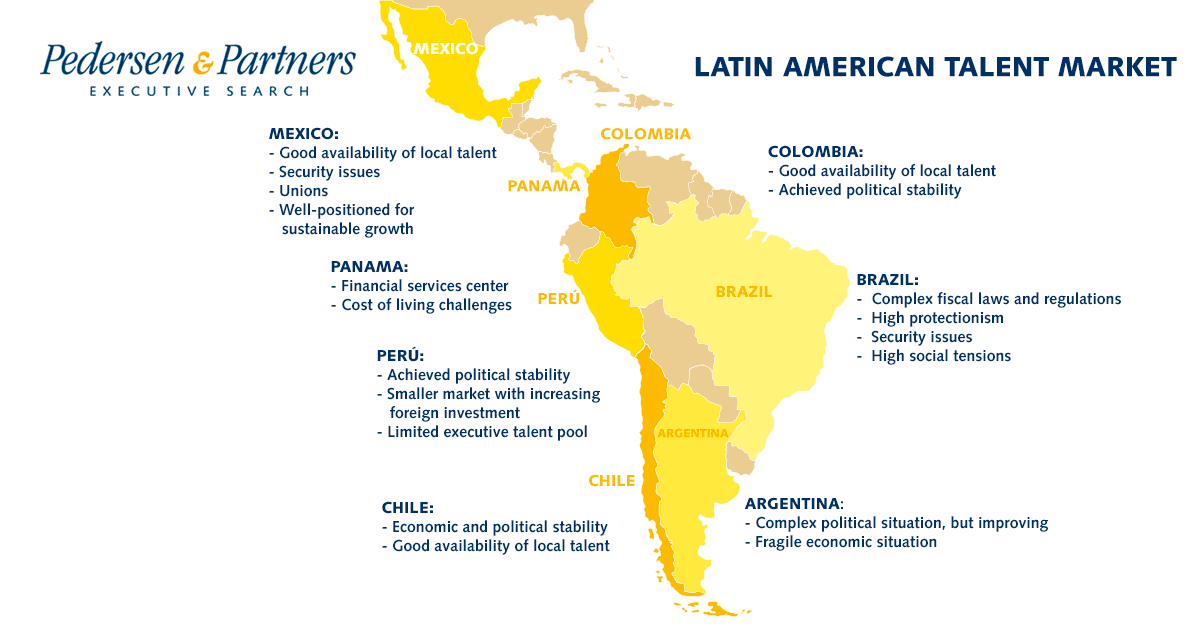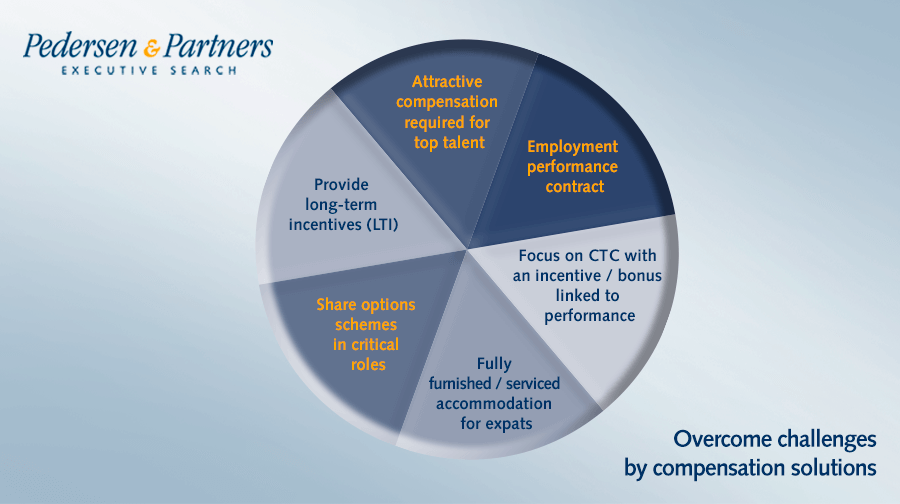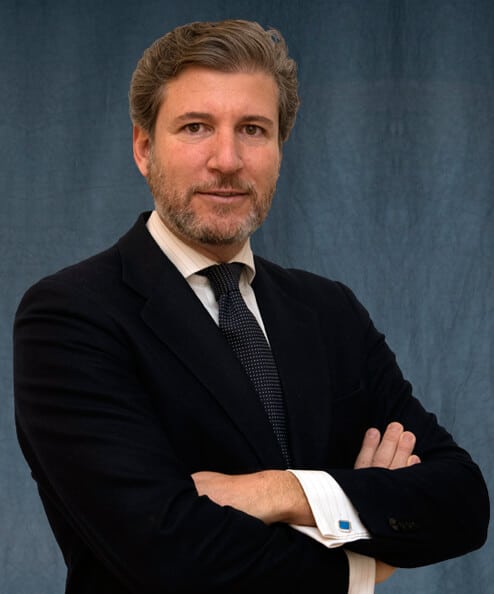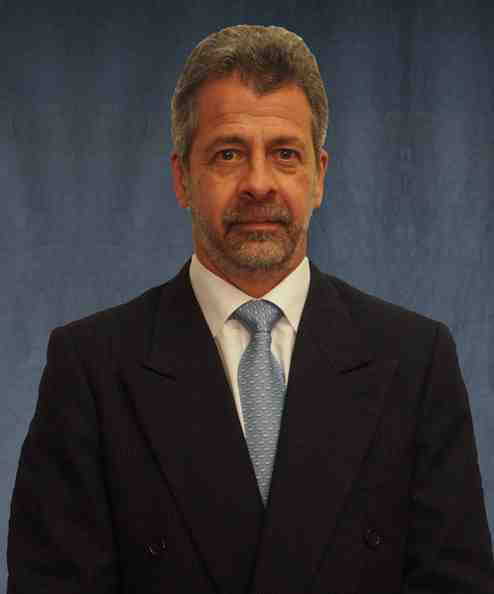Best talent practices for successful Latin American operations
We have seen an increasing number of international firms moving their Latin American headquarters to Miami, Houston, Panamá, Mexico and other countries in the region, and in the process facing the inherent challenges of hiring senior executives across the continent.

For many international firms in Latin America, attracting world-class talent for their main offices and regional subsidiaries can be challenging. This is still a developing region with many companies that are not yet fully mature. We are seeing increasing inflation and high rents in this market. The relocation process involves many practical and technical together with an array of administrative and legal considerations. In order to keep the expenditure of time and money under control, the relocation process must be closely monitored and supervised right up to the start date.
Moreover, there are complex challenges in attracting the best talent for Latin American offices. There is a common misconception that Latin America can be treated as a single country. If we include Central America, Cuba and Mexico, Latin America comprises 22 very different nations speaking a common language (with the exception of Brazil). Each Latin American country has its own culture, infrastructure and political situation, and what works in one will not necessarily work in others. Having said this, political instability, corruption, and currency devaluation are issues that appear in one form or another across the continent. Expatriates are generally welcomed, although work permits are increasingly an issue. World-class talent does exist in many Latin American countries, but may not always be appropriate for multinationals. Salaries are often higher than for equivalent positions in the USA; there is very little accurate benchmarking and job titles may mean very little. These are just a few of the challenges facing firms in Latin America today.
Infographic: Latin American Talent Market

The recruitment challenges in many of the Latin American local talent markets are often similar, ranging from general skills shortages and security issues to the infrastructure and cost of living challenges that are noted in Mexico, Colombia, Brazil and Argentina. In more developed markets such as Chile and Mexico, the unions have a restrictive effect on trade and industry competitiveness. However, talented local specialists are widely available in Chile, Colombia and Mexico, most of them having studied in the USA.
Some countries in Latin America have a diaspora of native talent working outside the region. Mexican specialists are found working in the USA due to proximity; many well-educated Colombians relocated to Europe many years ago for security reasons and did not return; Chileans and Argentineans provide a rich source of expatriate talent for many Spanish and USA multinationals relocating to other Latin American countries.
How do firms overcome these challenges and attract the best possible talent to drive their Latin American operations forward? Employers in high-risk industries and countries must rely heavily on compensation packages, with a great focus on bonuses, long-term incentives and performance-linked share option schemes.
Chart: Overcome challenges by compensation solutions

Once on board, the expat talent must be empowered and supported by a strong management structure. These professionals will want to be placed in short-term key roles for two to three years, so that they can develop professionally and financially, and they are likely to demand a culturally integrated approach coupled with a strong business strategy. They will demand the best Human Resources practices for their teams and the best business practices for their operations, as few will wish to stay in the same place long-term. This is where the alignment between the organisational culture and the personal and professional aspirations of the employee will play a great role. If the employee and employer both demonstrate adaptability, flexibility and willingness to be open about each other’s aims, there is a much greater probability of employee engagement and subsequent growth and development.
When developing a long-term talent strategy, employers must engender a preference for developing and nurturing local talent to be primed for future leadership responsibilities. Transitions frequently cause serious talent turnover and turbulence, but this impact can be reduced with a well-maintained talent pipeline. Executive education programmes fortified by targeted mentorship projects serve as the best greenhouse where new talent can sprout, be selected early on and invested in. This will require management attention and capital resources to be fully dedicated to engaging medium to long-term commitment.
An effective and attractive employer value proposition will not only secure the best talent, but also ensure its retention. Well-defined and customised professional development plans are an important part of the package. Prioritising a comprehensive, multi-faceted and flexible talent attraction strategy specifically directed at Latin American professionals will be of great long-term benefit to the companies willing to invest in this endeavour.
Pedersen & Partners is one of the fastest-growing, fully integrated Executive Search firms worldwide; it is 100% owned by its partners who all work full-time to serve its clients. The firm celebrated its 15th anniversary in January 2016, and to mark this occasion, it has created a timeline web page, featuring key milestones for the firm’s development and has released an anniversary video.
 Alvaro Arias is the Partner in charge of Iberia & Latin America at Pedersen & Partners. Mr. Arias brings over 15 years of Executive Search experience, having successfully completed Executive Search assignments across Europe and Latin America with a particular focus on Industrial (Energy, Construction, Engineering and Equipment), Financial Services (Banking and Private Equity), Chemical, Health and Telecommunications. Prior to joining the firm, Mr. Arias held senior positions as a Partner and member of the International Executive Committee of an international Executive Search firm based in Austria. Earlier in his career, he was a Principal with a world-leading Executive Search firm based in Switzerland and Senior Manager at AT Kearney. He was also Professor at IESE Business School where he founded and led its International Research Centre in Barcelona and Madrid.
Alvaro Arias is the Partner in charge of Iberia & Latin America at Pedersen & Partners. Mr. Arias brings over 15 years of Executive Search experience, having successfully completed Executive Search assignments across Europe and Latin America with a particular focus on Industrial (Energy, Construction, Engineering and Equipment), Financial Services (Banking and Private Equity), Chemical, Health and Telecommunications. Prior to joining the firm, Mr. Arias held senior positions as a Partner and member of the International Executive Committee of an international Executive Search firm based in Austria. Earlier in his career, he was a Principal with a world-leading Executive Search firm based in Switzerland and Senior Manager at AT Kearney. He was also Professor at IESE Business School where he founded and led its International Research Centre in Barcelona and Madrid.
 Luis Miguel Vilatela is a Client Partner and the Country Manager for Mexico at Pedersen & Partners. Prior to joining the Executive Search industry, Mr. Vilatela gained extensive experience in Finance & Banking with HSBC Bank UK where he started his career as an Assistant Director in 1992 and subsequently relocated with HSBC to Mexico. There he served as Chief Executive Officer, Country Manager, Deputy General Director, and later was appointed as CEO, responsible for Spain and Portugal. Additionally, Mr. Vilatela has previously held several C-Level roles in such organizations as Mexico Fund-Merrill Lynch, Citibank Mexico, Bank of America and Midland Bank.
Luis Miguel Vilatela is a Client Partner and the Country Manager for Mexico at Pedersen & Partners. Prior to joining the Executive Search industry, Mr. Vilatela gained extensive experience in Finance & Banking with HSBC Bank UK where he started his career as an Assistant Director in 1992 and subsequently relocated with HSBC to Mexico. There he served as Chief Executive Officer, Country Manager, Deputy General Director, and later was appointed as CEO, responsible for Spain and Portugal. Additionally, Mr. Vilatela has previously held several C-Level roles in such organizations as Mexico Fund-Merrill Lynch, Citibank Mexico, Bank of America and Midland Bank.
Pedersen & Partners is a leading international Executive Search firm. We operate 56 wholly owned offices in 52 countries across Europe, the Middle East, Africa, Asia & the Americas. Our values Trust, Relationship and Professionalism apply to our interaction with clients as well as executives. More information about Pedersen & Partners is available at www.pedersenandpartners.com
If you would like to conduct an interview with a representative of Pedersen & Partners, or have other media-related requests, please contact: Diana Danu, Marketing and Communications Manager at: diana.danu@pedersenandpartners.com
